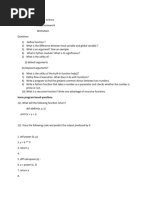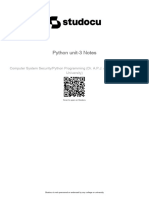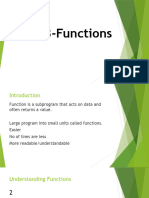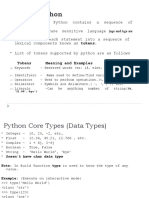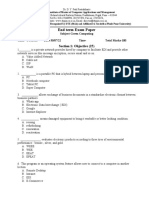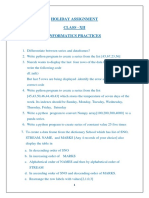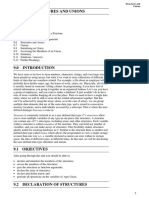Functions
Uploaded by
SubhAsh Birajdar SBFunctions
Uploaded by
SubhAsh Birajdar SBvenkatesh.mansani@yahoo.
com Naresh i Technologies
Functions
Functions:
A group of statements into a single logical unit is called as function.
Functions are used to perform the task.
Function is not called automatically.
Function body is executed whenever we call the function.
Function can be called any number of times.
Advantages of Functions:
1) Modularity
2) Reusability
Functions are divided into 4 categories:
1) Functions with arguments and with return value.
2) Functions with arguments and without return value.
3) Functions without arguments and with return value.
4) Functions without arguments and without return value.
1) Functions with arguments and with return value:
Syntax:
def function_name(arg1, arg2, …):
Statement1
Statement2
=========
return Statement
Example:
def max(a, b):
Python By Venkatesh Mansani Naresh i Technologies
venkatesh.mansani@yahoo.com Naresh i Technologies
if a>b:
return a
else:
return b
x=max(10, 20)
print(x)
2) Functions with arguments and without return value:
Syntax:
def function_name(arg1, arg2, …):
Statement1
Statement2
=========
Example:
def max(a, b):
if a>b:
print(a)
else:
print(b)
max(10, 20)
3) Functions without arguments and with return value:
Syntax:
def function_name():
Statement1
Statement2
Python By Venkatesh Mansani Naresh i Technologies
venkatesh.mansani@yahoo.com Naresh i Technologies
=========
return Statement
Example:
def max():
a, b = 10, 20
if a>b:
return a
else:
return b
x=max()
print(x)
4) Functions without arguments and without return value:
Syntax:
def function_name():
Statement1
Statement2
Example:
def max():
a, b = 10, 20
if a>b:
print(a)
else:
print(b)
max()
Python By Venkatesh Mansani Naresh i Technologies
venkatesh.mansani@yahoo.com Naresh i Technologies
Function Components:
def add(a, b):
c=a+b
return c
x=add(10, 20)
print(x)
In the above example
def add(a, b): => Function Header
def is a keyword and it is used to define a function, a & b are called formal
arguments or formal parameters.
return c => Return Statement
return is a keyword and it is used to return a value.
x=add(10, 20) => Function Call Statement
10 & 20 are called actual arguments or actual parameters.
Types of arguments:
1) Non Default Arguments
2) Default Arguments
3) Arbitrary Arguments
4) Keyword Arguments
5) Non Keyword Arguments
1) Non Default Arguments
The arguments that are declared without assigning values are called default
arguments.
At the time of calling a function we must pass values to non default arguments.
Example:
def add(a, b):
Python By Venkatesh Mansani Naresh i Technologies
venkatesh.mansani@yahoo.com Naresh i Technologies
c=a+b
print(c)
add(10, 20) => Valid
add() => Error
2) Default Arguments
The arguments that are declared by assigning values in a function header are
called default arguments.
At the time of calling function passing values are optional to default arguments.
Example:
def add(a=10, b=20):
c=a+b
print(c)
add() => Valid
add(30, 40) => Valid
3) Arbitrary Arguments
The arguments that are prefixed with * & ** are called arbitrary arguments.
If the argument prefixed with * is tuple type.
If the argument prefixed with ** is dict type.
It allows to pass 0 to any number of arguments to a function.
Example1:
def add(*a):
print(type(a))
for i in a:
print(i)
Python By Venkatesh Mansani Naresh i Technologies
venkatesh.mansani@yahoo.com Naresh i Technologies
add() => Valid
add(10) => Valid
add(33, 45) => Valid
add(31, 13, 54) => Valid
Example2:
def display(**a):
print(type(a))
for i in a:
print(i, "=>", a[i])
display(x=10, y=20, z=30)
4) Keyword Arguments
The arguments that are passed with assigning to variables are called keyword
arguments.
Example:
def add(a, b):
print(a+b)
add(a=10, b=2) => Valid
add(b=2, a=10) => Valid
5) Non Keyword Arguments
The arguments that are passed without assigning to variables are called non
keyword arguments.
Example:
def add(a, b):
print(a+b)
Python By Venkatesh Mansani Naresh i Technologies
venkatesh.mansani@yahoo.com Naresh i Technologies
add(10, 20)
Recursive Function:
A function that calls itself again and again is called as recursive function.
Example:
def fact(n):
if n==1:
return 1
else:
return n*fact(n-1)
x=fact(5)
print(x)
By
Mr. Venatesh Mansani
Naresh i Technologies
Python By Venkatesh Mansani Naresh i Technologies
You might also like
- Python Unit - 2 Functions, Exception and FILES - MCANo ratings yetPython Unit - 2 Functions, Exception and FILES - MCA65 pages
- Solution Libraries and Recursion WorksheetNo ratings yetSolution Libraries and Recursion Worksheet5 pages
- Half Yearly 2022 Answer Key With Masrking Scheme Sample Paper 1No ratings yetHalf Yearly 2022 Answer Key With Masrking Scheme Sample Paper 115 pages
- ACFrOgAFxMXeVsL7D8mNm 773cx0dijMRkOCuprgXGwyWrqRz5AxjBOxwizYMDbk1lmd25yIn O0 An Ko GxXSacuZ6vSZ2WjFJtFqmtIbReUL SR-0IyR5xZsSwR6O5LLuKtv16VN87Tr9ddMLNo ratings yetACFrOgAFxMXeVsL7D8mNm 773cx0dijMRkOCuprgXGwyWrqRz5AxjBOxwizYMDbk1lmd25yIn O0 An Ko GxXSacuZ6vSZ2WjFJtFqmtIbReUL SR-0IyR5xZsSwR6O5LLuKtv16VN87Tr9ddML5 pages
- Computer Science Class-Xii Code No. 083 2021-22: Functions in PythonNo ratings yetComputer Science Class-Xii Code No. 083 2021-22: Functions in Python21 pages
- CS 61A Higher Order Functions Summer 2019 1 Higher Order FunctionsNo ratings yetCS 61A Higher Order Functions Summer 2019 1 Higher Order Functions9 pages
- Application Based Programming in Python Chapter 2No ratings yetApplication Based Programming in Python Chapter 213 pages
- Python Advanced Programming: The Guide to Learn Python Programming. Reference with Exercises and Samples About Dynamical Programming, Multithreading, Multiprocessing, Debugging, Testing and MoreFrom EverandPython Advanced Programming: The Guide to Learn Python Programming. Reference with Exercises and Samples About Dynamical Programming, Multithreading, Multiprocessing, Debugging, Testing and MoreNo ratings yet
- B - 11 - Vaishnavi Gangshettiwar - Project ReportNo ratings yetB - 11 - Vaishnavi Gangshettiwar - Project Report29 pages
- Mid Term Exam Paper: Section 1: ObjectiveNo ratings yetMid Term Exam Paper: Section 1: Objective4 pages
- End Term Exam Paper: Section 1: ObjectiveNo ratings yetEnd Term Exam Paper: Section 1: Objective4 pages
- Analysis and Design:: Functionlal RequirementsNo ratings yetAnalysis and Design:: Functionlal Requirements3 pages
- Module 5 Structure, Union and Enumerated Data Type100% (2)Module 5 Structure, Union and Enumerated Data Type17 pages
- [Ebooks PDF] download Programming Algorithms in Lisp Writing Efficient Programs with Examples in ANSI Common Lisp 1st ed. Edition Vsevolod Domkin full chapters100% (11)[Ebooks PDF] download Programming Algorithms in Lisp Writing Efficient Programs with Examples in ANSI Common Lisp 1st ed. Edition Vsevolod Domkin full chapters47 pages
- State of Vue - Js 2021 Report by MonterailNo ratings yetState of Vue - Js 2021 Report by Monterail99 pages
- Abu Hamour Branch, Doha - Qatar: M.E.S Indian School (Mesis)No ratings yetAbu Hamour Branch, Doha - Qatar: M.E.S Indian School (Mesis)9 pages
- Holiday Assignment Class - Xii Informatics PracticesNo ratings yetHoliday Assignment Class - Xii Informatics Practices4 pages
- Exp 9 - Singly Circular Linked List (SCLL)No ratings yetExp 9 - Singly Circular Linked List (SCLL)9 pages
- Mod Menu Log - Com - Nekki.shadowfightfNo ratings yetMod Menu Log - Com - Nekki.shadowfightf182 pages
- Chapter 2: Review Exercise Solutions R2.1No ratings yetChapter 2: Review Exercise Solutions R2.14 pages
- 11th Computer Science EM 2nd Mid Term Exam 2023 Question Paper Virudhunagar District English Medium PDF DownloadNo ratings yet11th Computer Science EM 2nd Mid Term Exam 2023 Question Paper Virudhunagar District English Medium PDF Download2 pages
- Python Unit - 2 Functions, Exception and FILES - MCAPython Unit - 2 Functions, Exception and FILES - MCA
- Half Yearly 2022 Answer Key With Masrking Scheme Sample Paper 1Half Yearly 2022 Answer Key With Masrking Scheme Sample Paper 1
- ACFrOgAFxMXeVsL7D8mNm 773cx0dijMRkOCuprgXGwyWrqRz5AxjBOxwizYMDbk1lmd25yIn O0 An Ko GxXSacuZ6vSZ2WjFJtFqmtIbReUL SR-0IyR5xZsSwR6O5LLuKtv16VN87Tr9ddMLACFrOgAFxMXeVsL7D8mNm 773cx0dijMRkOCuprgXGwyWrqRz5AxjBOxwizYMDbk1lmd25yIn O0 An Ko GxXSacuZ6vSZ2WjFJtFqmtIbReUL SR-0IyR5xZsSwR6O5LLuKtv16VN87Tr9ddML
- Computer Science Class-Xii Code No. 083 2021-22: Functions in PythonComputer Science Class-Xii Code No. 083 2021-22: Functions in Python
- CS 61A Higher Order Functions Summer 2019 1 Higher Order FunctionsCS 61A Higher Order Functions Summer 2019 1 Higher Order Functions
- Python Advanced Programming: The Guide to Learn Python Programming. Reference with Exercises and Samples About Dynamical Programming, Multithreading, Multiprocessing, Debugging, Testing and MoreFrom EverandPython Advanced Programming: The Guide to Learn Python Programming. Reference with Exercises and Samples About Dynamical Programming, Multithreading, Multiprocessing, Debugging, Testing and More
- Module 5 Structure, Union and Enumerated Data TypeModule 5 Structure, Union and Enumerated Data Type
- [Ebooks PDF] download Programming Algorithms in Lisp Writing Efficient Programs with Examples in ANSI Common Lisp 1st ed. Edition Vsevolod Domkin full chapters[Ebooks PDF] download Programming Algorithms in Lisp Writing Efficient Programs with Examples in ANSI Common Lisp 1st ed. Edition Vsevolod Domkin full chapters
- Abu Hamour Branch, Doha - Qatar: M.E.S Indian School (Mesis)Abu Hamour Branch, Doha - Qatar: M.E.S Indian School (Mesis)
- Holiday Assignment Class - Xii Informatics PracticesHoliday Assignment Class - Xii Informatics Practices
- 11th Computer Science EM 2nd Mid Term Exam 2023 Question Paper Virudhunagar District English Medium PDF Download11th Computer Science EM 2nd Mid Term Exam 2023 Question Paper Virudhunagar District English Medium PDF Download









